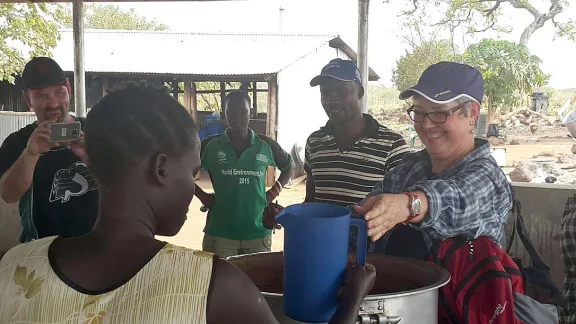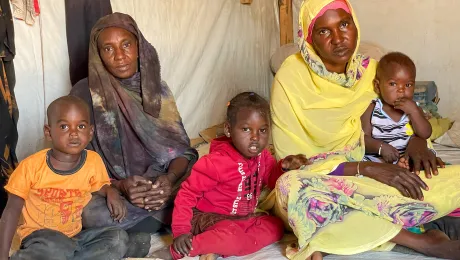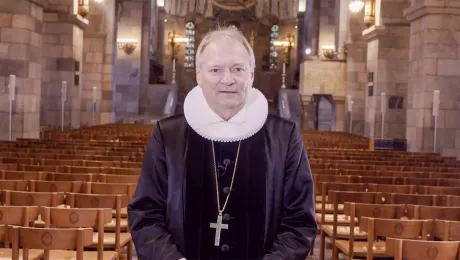
Bishop Susan Johnson handing out relief goods to refugees in Nyumanzi reception center. Photo: LWF Uganda
Canadian Bishop visits Adjumani refugee camp
(LWI) - “Someone told me: statistics are human beings with the tears dried off,” Bishop Susan Johnson of the Evangelical Lutheran Church in Canada says. “Having the chance to meet refugees reminds us of the individuals who make up those statistics.”
From the 18 to 21 January, LWF Uganda hosted the 2016 Canadian Lutheran World Relief Global Encounter Tour. The program takes Canadian Lutherans all over the world to visit communities supported by Canadian Lutheran World Relief (CLWR). This year, the group, which included the National Bishop of the Evangelical Lutheran Church in Canada, visited Adjumani Refugee Settlement in northern Uganda, which has been supported by CWLR since March 2015.
120,000 refugees and rising
Adjumani district has a long history of hosting refugees from South Sudan. Everytime conflict breaks out, people flee to safety across the border, to return when things calm down. Currently, Adjumani is again experiencing one of those peak moments: 120,181 South Sudanese refugees have come here since the outbreak of violence in December 2013. The Lutheran World Federation (LWF) is providing support to 60% of the refugee population.
The journey of the Canadian delegation also marked the first landing at the new airstrip in Adjumani, which was built by LWF to ease staff travel and the transport of relief goods to the camp. The airstrip was completed in December.
The group, which also included Robert Granke, CLWR executive director, and board member David Schulze, began their tour in Kampala where they visited one of Kampala’s slums, Bwaise 3 in the Kawempe division of Kampala. Under ACT Alliance, the Lutheran World Federation (LWF) works towards increasing access to the site in order to secure tenure, ensure adequate shelter, basic services and construct the buildings required for communities to be healthy.
In Bwaise 3, the group met locals who demonstrated how LWF income generation activities and saving schemes were improving their livelihoods. They also highlighted how negotiation and partnership skills have been instrumental in allowing them to communicate with authorities, preventing forced evictions. In his concluding remarks, Granke said, “we are deeply impressed by the creativity and hard work especially by women and moved by the courage and hope of the LWF.”
Scope of work expanded
In Adjumani, the delegation visisted the Nyumanzi Transit Centre where recent arrivals spend 2 to 4 weeks as they await land allocations within the settlements. The rest of the afternoon was spent in Nyumanzi Settlement where the group witnessed the distribution of relief goods to unaccompanied minors and separated children, and visited women’s groups who have benefited from agricultural training supported by CWLR. "The scope of the work has expanded, you can see that,” Bishop Johnson said. “While interacting with people in the settlements, there was a sign of contentment which suggests to me that basic services are being provided.” There was also a visit to the host community, which had been provided with boreholes provided by CLWR.
"I am most impressed by the dedication of the staff. People work in really difficult conditions but their commitment to the work and the people they serve is exemplary and it makes me really proud to be part of the Lutheran World Federation," Bishop Johnson said.
Address needs of refugees
The most powerful component of their trip came in form of a visit to Elegu Border Point. Managed by LWF, the border point serves as the point of entry for most South Sudanese refugees into Uganda. At Elegu, the group gained knowledge on how new arrivals are processed upon arrival, including registration, identification of vulnerable people and those needing psycho-social support.
On the day of the visit, LWF processed 205 new arrivals, mostly women and children. While speaking with recent arrivals, the group received a firsthand account of the situation in South Sudan, with many citing hunger, violence and fear as reasons for leaving their homes.
One of the refugees who shared her story was a 14-year-old girl who had lost her parents and her grandmother. She had just made the journey from Bor County by herself and arrived the previous evening. Most likely she will be registered as an unaccompanied minor and will be cared for in a shelter if none of her relatives are found or are willing to take her in.
"At CLWR we keep on thinking on how to challenge our government to respond to the South Sudanese influx and through the good work of our team,” Granke said. “It is my hope that this is just the beginning of more support for LWF Uganda. We continue to look for ways in which CLWR can help address gap areas like psycho-social and agricultural extension work. My general feeling is that this is the beginning of a longterm relationship."


